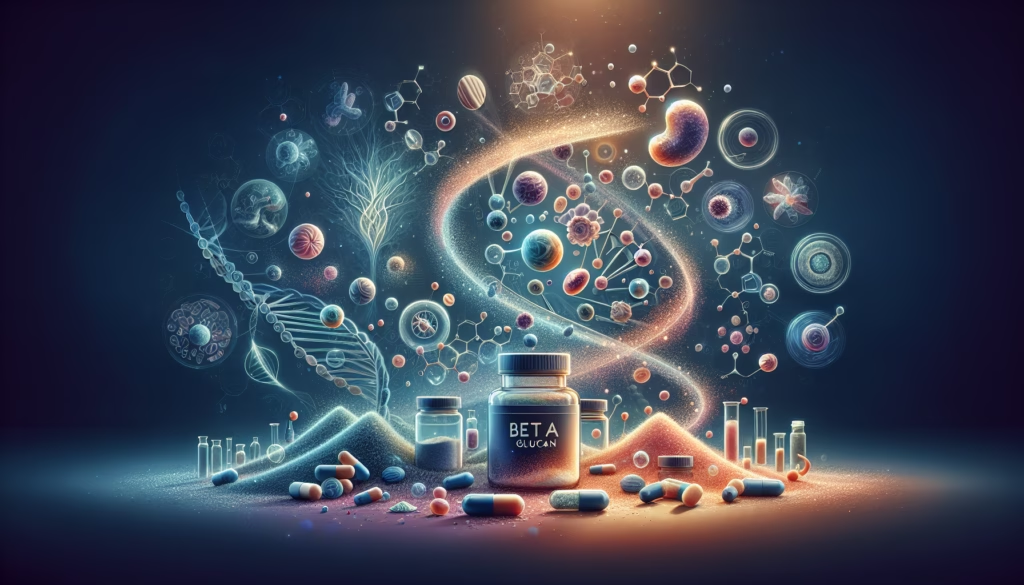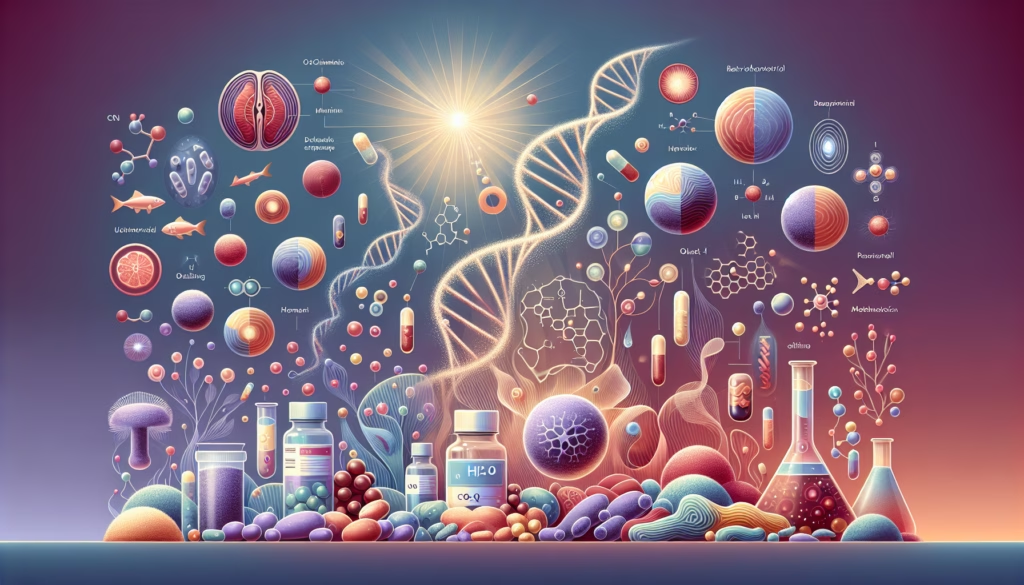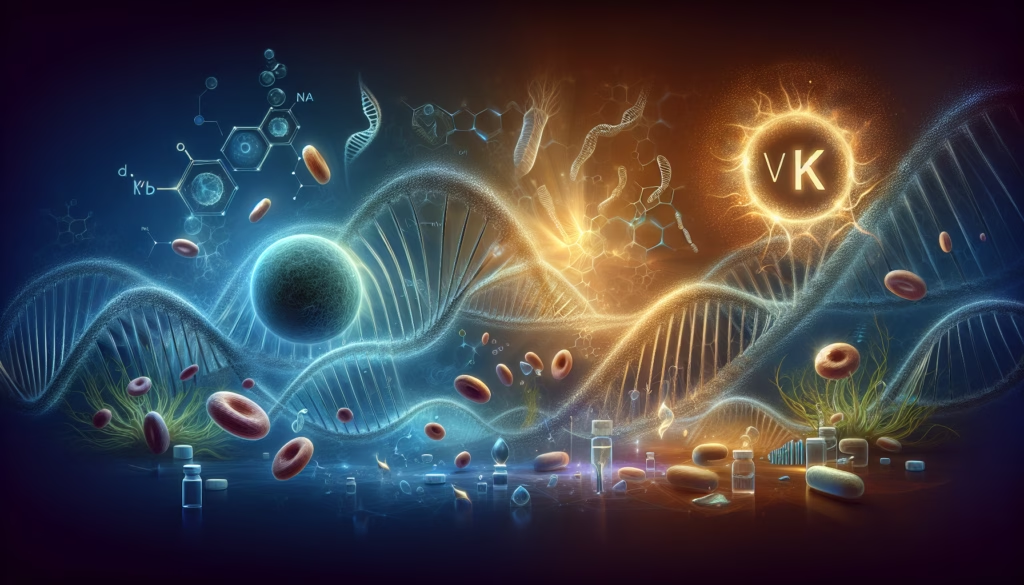
Beta Glucan
Discover the science-backed potential of beta glucan as an adjunct in cancer therapy. This post delves into the latest research
Click 
Silibinin exerts its biological effects by interacting with various molecular targets within cells.
Molecular Mechanisms: Silibinin exhibits antioxidant activity by scavenging free radicals and modulating intracellular redox status. It effectively inhibits lipid peroxidation, thus protecting cell membranes from oxidative damage.
Anti-cancer Properties: Preclinical studies indicate potential anti-cancer effects of silibinin. In vitro studies have demonstrated that silibinin can inhibit proliferation and induce apoptosis in various cancer cell lines. These findings highlight the necessity for larger, rigorously designed clinical trials to validate clinical efficacy in humans.
Metabolic Interactions: Silibinin influences cellular metabolism, particularly glucose uptake and utilization. Research suggests it may inhibit glycolysis, a metabolic pathway often upregulated in cancer cells. The precise mechanisms and clinical relevance require further exploration.
Key Research Findings: A meta-analysis published in “Integrative Cancer Therapies” (2015) assessed the use of silibinin in cancer patients, finding evidence for improved quality of life and reduced chemotherapy side effects. The authors emphasised the necessity for larger, rigorously designed clinical trials to validate these findings.
Relation to Metabolic Theory of Cancer: Silibinin’s ability to modulate glucose metabolism aligns with the metabolic theory of cancer, positing that cancer stems from mitochondrial dysfunction and altered cellular metabolism.
Clinical trials have utilised silibinin doses ranging from 200 mg to 1000 mg daily; however, optimal dosing strategies are yet to be definitively determined.
Breast Cancer, Liver Cancer, Lung Cancer, Prostate Cancer
Silibinin is generally well-tolerated.
Mild gastrointestinal discomfort is the most frequently reported side effect.
Apart from mild gastrointestinal discomfort, which includes symptoms like diarrhea, bloating, gas, and nausea, other common side effects of milk thistle (and by extension, silibinin) include:
Headaches: Some individuals may experience headaches as a side effect12.
Skin reactions: Pruritus, rash, urticaria, and eczema have been reported13.
Neuropsychological events: These can include asthenia, malaise, and insomnia1.
Joint pain: Arthralgia or joint pain is another potential side effect2.
Allergic reactions: Although rare, severe allergic reactions like anaphylaxis can occur, especially in individuals allergic to plants in the Asteraceae family23.
These side effects are generally mild and not as common as gastrointestinal issues, but they are worth noting.
Combination studies involving silibinin have shown promising results, particularly in cancer treatment. However, when it comes to interactions with other drugs, there are several considerations:
Silibinin and Chemotherapy Drugs: Silibinin has been shown to enhance the effects of chemotherapy drugs like doxorubicin, cisplatin, and carboplatin in various cancer types, including hepatocellular carcinoma and breast cancer. These combinations often result in synergistic effects, increasing cell death and growth inhibition13.
Silibinin and Sorafenib/Gefitinib: In hepatocellular carcinoma, combining silibinin with sorafenib or gefitinib enhances growth inhibition and apoptosis in cancer cells. These combinations target both cancer cells and cancer stem cells, offering a potential therapeutic approach16.
Silibinin and Temozolomide: Silibinin potentiates the cytotoxic effects of temozolomide in glioblastoma cells, suggesting potential benefits in brain cancer treatment5.
While silibinin itself is generally well-tolerated, milk thistle (from which silibinin is derived) can interact with various medications:
Liver-Metabolized Drugs: Milk thistle may affect the metabolism of drugs like acetaminophen, haloperidol, lamotrigine, and morphine, potentially altering their efficacy or side effects24.
Tamoxifen: Milk thistle may increase the absorption of tamoxifen, potentially enhancing its effects and side effects2.
Diabetes Medications: Milk thistle can lower blood sugar levels, which may necessitate adjustments in diabetes medication dosages2.
Warfarin: Milk thistle may increase the risk of bleeding when taken with warfarin by enhancing its effects24.
Sirolimus: Milk thistle may decrease the liver’s breakdown of sirolimus, potentially increasing its side effects2.
P-Glycoprotein Substrates: Milk thistle can affect the absorption of drugs transported by P-glycoprotein, potentially leading to increased side effects2.
It is crucial to consult a healthcare provider before using silibinin or milk thistle, especially if you are taking other medications.
The expected quality of life impacts for individuals taking silibinin can vary based on the specific condition being treated.
However, here are some general insights:
Liver Conditions: For patients with liver diseases such as cirrhosis, silibinin may improve liver function and reduce liver-related mortality, potentially enhancing overall quality of life by reducing symptoms associated with liver dysfunction2. Additionally, it can improve glycemic control in patients with diabetes and liver disease, which may further contribute to better health outcomes2.
Cancer Treatment: In cancer patients, silibinin may help reduce side effects associated with chemotherapy and improve treatment outcomes by enhancing the efficacy of chemotherapeutic agents. This could lead to improved quality of life by reducing symptoms like nausea, fatigue, and pain, although specific studies on quality of life metrics are limited1.
Antioxidant and Anti-inflammatory Effects: Silibinin’s antioxidant and anti-inflammatory properties can help reduce oxidative stress and inflammation, potentially benefiting conditions like Alzheimer’s and Parkinson’s diseases. While direct quality of life studies are scarce, these effects could contribute to improved cognitive and motor functions1.
Side Effects: Generally, silibinin is well-tolerated with mild side effects such as gastrointestinal discomfort. This low side effect profile suggests that it may not significantly detract from quality of life, unlike some other medications with more severe side effects2.
Silibinin may improve quality of life by enhancing liver function, reducing cancer treatment side effects, and mitigating oxidative stress and inflammation, although more specific quality of life studies are needed to fully understand its impact.
We’ve done our best to include as much information as possible for this supplement.
If you have any other questions, please send us a message or join our Skool Group and ask our knowledgeable and friendly community.
Silibinin is widely available as a dietary supplement in most countries through health stores and online retailers.
Liver Conditions: Silibinin is particularly beneficial for individuals with liver conditions such as cirrhosis, hepatitis, and drug-induced liver injury. It has shown promise in improving liver function and reducing liver damage56.
Cancer Patients: Silibinin has demonstrated potential in treating various cancers, including prostate, breast, lung, and liver cancers. It may be especially beneficial when combined with chemotherapy drugs14.
High-Risk Populations: Individuals at high risk of liver damage, such as those taking hepatotoxic medications or consuming alcohol excessively, may benefit from silibinin’s protective effects26.
Rheumatoid Arthritis Patients: Silibinin has also shown benefits when used alongside methotrexate in patients with active rheumatoid arthritis, enhancing the therapeutic effects of methotrexate7.
Overall, silibinin appears to be beneficial for a wide range of conditions, particularly those involving liver health and cancer treatment.
However, individual responses may vary, and more research is needed to fully understand its efficacy across diverse populations.
Trials and studies have provided insights into how silibinin interacts with resistance mechanisms in cancer cells.
Here’s a summary of what has been discovered:
P-Glycoprotein (P-gp) Expression: Silibinin has been shown to reduce P-gp expression in drug-resistant cancer cells, such as ovarian cancer cells resistant to paclitaxel1. This reduction helps overcome drug resistance by decreasing the efflux of chemotherapeutic agents from cancer cells.
Survivin Overexpression: In paclitaxel-resistant ovarian cancer cells, silibinin downregulates survivin expression, which is associated with resistance to apoptosis and microtubule stabilization1. By reducing survivin levels, silibinin enhances the sensitivity of cancer cells to chemotherapy drugs.
Epithelial-to-Mesenchymal Transition (EMT): Silibinin reverses EMT, a process linked to drug resistance and tumor aggressiveness. It decreases mesenchymal markers like SNAIL, ZEB, and N-cadherin while increasing epithelial markers like E-cadherin, thereby overcoming resistance to drugs like erlotinib in non-small cell lung cancer (NSCLC)3.
EGFR Mutations and T790M Resistance: Silibinin enhances the efficacy of EGFR tyrosine kinase inhibitors (TKIs) like gefitinib and erlotinib by downregulating EGFR signals in cells with EGFR mutations, including those with the T790M mutation7. This helps overcome acquired resistance to EGFR-TKIs.
STAT3, AKT, and ERK Pathways: Silibinin suppresses key oncogenic pathways such as STAT3, AKT, and ERK in drug-resistant breast cancer cells, further contributing to its ability to overcome resistance2.
Silibinin addresses resistance mechanisms by modulating P-gp expression, survivin levels, EMT, and key signalling pathways, making it a valuable adjunct in chemotherapy regimens to enhance drug sensitivity and efficacy.
While these indicators are promising, more research is needed on a larger scale to determine if all of these benefits translate into the desired outcomes for warriors using metabolic therapy as a treatment for cancer.
Preclinical studies on silibinin have explored its potential therapeutic effects across various conditions, particularly in cancer and liver diseases. Here’s an overview of these studies:
Bladder Cancer: Silibinin has shown efficacy in inhibiting bladder cancer cell growth and metastasis. It reduces cell proliferation, microvessel density, and enhances apoptosis in bladder cancer models. Silibinin also reverses epithelial-to-mesenchymal transition (EMT) by inhibiting β-catenin/ZEB1 signaling, which is crucial for cancer cell migration and invasion1.
Prostate Cancer: Silibinin exhibits anti-proliferative and apoptotic effects in rat prostate cancer cells. It inhibits cell cycle progression and disrupts mitogenic signaling pathways, including those involving epidermal growth factor receptor (EGFR) and insulin-like growth factor receptor type I1.
Pancreatic Cancer: Silibinin induces G1 arrest and apoptosis in pancreatic cancer cells by activating caspase-3 and reducing cyclin expression. It also inhibits cell proliferation and angiogenesis, suggesting potential benefits in pancreatic cancer treatment1.
Breast Cancer: Preclinical studies have demonstrated silibinin’s anti-tumoral activity in breast cancer cell lines. It modulates various signalling pathways to inhibit cancer cell growth and survival4.
Hepatoprotection: Silibinin is known for its hepatoprotective effects, promoting liver cell regeneration and reducing inflammation. It has been used to treat liver conditions such as cirrhosis and has shown potential in preventing liver damage from toxins4.
Hepatocellular Carcinoma (HCC): Silibinin, when combined with sorafenib, exhibits synergistic effects against HCC cells by inhibiting STAT3/ERK/AKT pathways and targeting cancer stem cells. This combination therapy effectively suppresses tumour growth and induces apoptosis in HCC models1.
Apoptosis Induction: Silibinin induces apoptosis in cancer cells through caspase-dependent and -independent pathways, involving changes in mitochondrial membrane potential and the release of cytochrome c1.
Anti-angiogenic Effects: It inhibits angiogenesis by reducing the production of proangiogenic factors, which is crucial for tumour growth and metastasis1.
EMT Reversal: Silibinin reverses EMT by modulating key transcription factors like ZEB1 and β-catenin, thereby reducing cancer cell migration and invasion1.
Overall, preclinical studies suggest that silibinin has broad therapeutic potential, particularly in cancer and liver diseases, through its ability to modulate various cellular pathways and mechanisms.
Several clinical trials exploring silibinin in cancer are currently ongoing. Detailed information can be accessed via ClinicalTrials.gov.
The effectiveness of silibinin can be influenced by various genetic markers, particularly those related to cancer and drug resistance.
Here are some insights into how genetic factors might impact the efficacy of silibinin:
EGFR Mutations: Silibinin has been shown to inhibit EGFR activity, which is crucial in non-small cell lung cancer (NSCLC) cells with EGFR mutations. It selectively reduces the activity of the EGFR family, including EGFR, ErbB2, and ErbB3, in cells with EGFR mutations but not in those with wild-type EGFR34. This suggests that silibinin may be more effective in patients with EGFR-mutant NSCLC.
T790M Mutation: In NSCLC, the T790M mutation is a common cause of resistance to EGFR tyrosine kinase inhibitors (TKIs) like gefitinib and erlotinib. Silibinin can enhance the effects of these TKIs by downregulating EGFR signals in cells with the T790M mutation, potentially overcoming resistance3.
Epithelial-to-Mesenchymal Transition (EMT): Silibinin can reverse EMT, a process associated with drug resistance and tumour aggressiveness. It downregulates mesenchymal markers like SNAIL, ZEB, and N-cadherin while upregulating epithelial markers like E-cadherin1. Patients with tumours exhibiting EMT features might benefit more from silibinin treatment.
MicroRNA Signatures: Silibinin modulates microRNA expression, such as downregulating miR-21 and upregulating miR-200c, which are involved in EMT and drug resistance1. These microRNA signatures could serve as biomarkers to predict silibinin efficacy.
Other Genetic Factors: While specific genetic markers like KRAS, NRAS, or BRAF mutations are not directly linked to silibinin efficacy, the drug’s ability to modulate various signalling pathways (e.g., PI3K/AKT, JAK2/STAT5) suggests potential benefits across different genetic backgrounds2.
Genetic markers related to EGFR mutations, T790M mutation, EMT status, and microRNA signatures may influence the effectiveness of silibinin.
Further research is needed to fully understand how these genetic factors impact silibinin’s therapeutic outcomes.

Discover the science-backed potential of beta glucan as an adjunct in cancer therapy. This post delves into the latest research

Explore the emerging world of hydrogen gas (H₂), also known as Brown Gas, and its remarkable potential as an adjunct

Explore the latest scientific insights into vitamin K2 and its promising role in cancer therapy. In this comprehensive blog post,
Apoptosis, or programmed cell death, is a natural process where cells self-destruct when they are damaged or no longer needed. This is crucial for maintaining healthy tissues and preventing diseases like cancer.
Drugs and supplements that induce apoptosis help eliminate cancerous cells by triggering this self-destruct mechanism, ensuring that harmful cells are removed without damaging surrounding healthy tissue.
Understanding and harnessing apoptosis is vital in the fight against cancer, as it targets the root cause of the disease at the cellular level.
Cell proliferation is the process by which cells grow and divide to produce more cells. While this is essential for growth and healing, uncontrolled cell proliferation can lead to cancer.
Drugs and supplements that inhibit cell proliferation help prevent the rapid multiplication of cancerous cells, slowing down or stopping the progression of the disease.
By targeting the mechanisms that drive cell division, these treatments play a vital role in controlling and potentially eradicating cancer.
Cancer cells often hijack specific biological pathways to grow and spread. Drugs and supplements that target these pathways can disrupt the cancer cell’s ability to survive and multiply.
By focusing on the unique mechanisms that cancer cells use, these treatments can be more effective and cause fewer side effects compared to traditional therapies.
Targeting specific pathways is a key strategy in precision medicine, offering a tailored approach to combat cancer at its core.
Angiogenesis is the process by which new blood vessels form, supplying nutrients and oxygen to tissues. Cancer cells exploit this process to fuel their growth and spread.
Drugs and supplements that inhibit angiogenesis can effectively starve cancer cells by blocking the formation of these new blood vessels.
By cutting off the supply lines that tumors rely on, angiogenesis inhibitors play a crucial role in controlling and potentially shrinking cancerous growths.
Immunotherapy harnesses the power of the body’s immune system to combat cancer. By boosting or restoring the immune system’s natural ability to detect and destroy cancer cells, immunotherapy offers a targeted and effective approach to treatment.
Drugs and supplements that support immunotherapy can enhance the immune response, making it more efficient at identifying and attacking cancer cells.
This innovative approach not only helps in treating cancer but also reduces the risk of recurrence, providing a powerful tool in the fight against this disease.
Inflammation is the body’s natural response to injury or infection, but chronic inflammation can contribute to the development and progression of cancer.
Drugs and supplements with anti-inflammatory properties help reduce inflammation, thereby lowering the risk of cancer and other chronic diseases.
By targeting the inflammatory processes, these treatments can help maintain a healthier cellular environment and prevent the conditions that allow cancer to thrive.